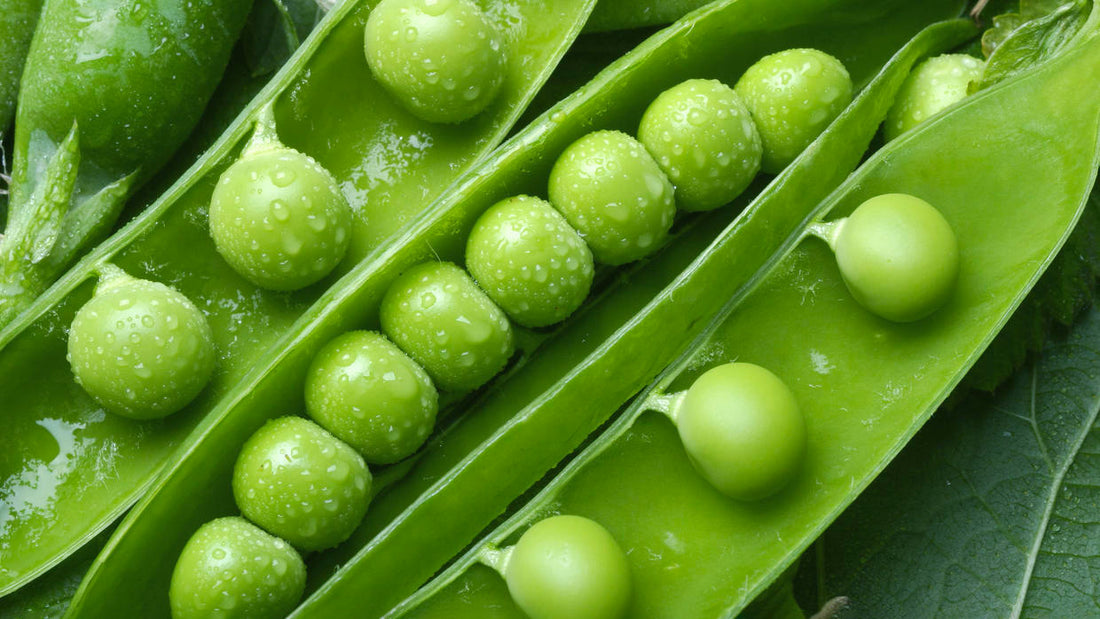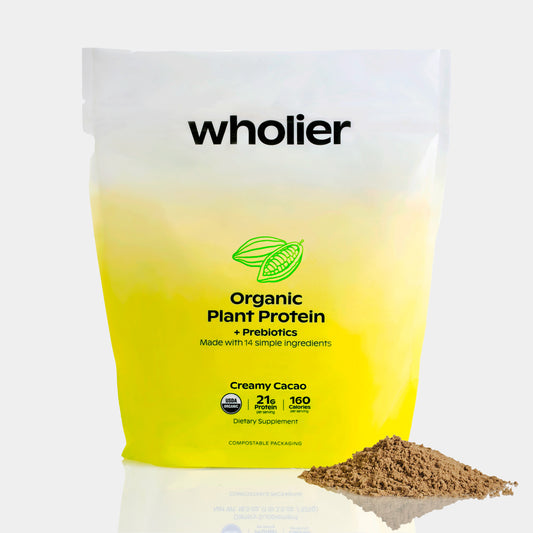
The Ultimate Guide to Protein-Rich Vegan Foods
The misconception that vegans are "protein deficient" has been debunked time and time again by scientific research(1). A well-planned vegan diet can provide all the essential nutrients, including protein, for optimal health(2). In this comprehensive guide, we'll dive into the importance of protein, daily protein requirements, and explore the top 10 highest sources of vegan protein. Let's get started!
Why is Protein So Important?
Protein is a crucial macronutrient that plays a vital role in numerous functions within the body, including building and repairing tissues, supporting immune function, and promoting overall growth and development(3). It's made up of building blocks called amino acids, which are essential for various physiological processes(4). In short, getting enough protein is vital for maintaining good health.
How Much Protein Should You Consume Daily?
The Recommended Dietary Allowance (RDA) for protein is 0.8 grams of protein per kilogram of body weight(5). For example, someone who weighs 187 pounds (about 66 kilograms) would require approximately 68 grams of protein per day. Individual protein needs can vary based on factors such as age, activity level, and overall health(6). For example, athletes and older adults may require more protein to support muscle repair and maintenance(7)(8).
Why Do People Think Vegans are "Protein Deficient"?
The misconception that vegans are "protein deficient" stems from the belief that plant-based protein sources are incomplete, meaning they don't contain all the essential amino acids(9). However, research has shown that consuming a variety of plant-based protein sources throughout the day can provide all the essential amino acids needed for optimal health(10).
What Are the Best Sources of Vegan Protein?
Now that we've covered the importance of protein and daily requirements, let's dive into the top 10 highest sources of vegan protein. These plant-based powerhouses will help you meet and exceed your protein goals while enjoying a diverse and satisfying diet:
- Seitan: Seitan, also known as wheat meat or wheat gluten, packs an impressive 25 grams of protein per 3.5-ounce serving(9). It's a versatile meat substitute that can be used in a variety of dishes like stir-fries, sandwiches, and stews.
- Tempeh: Tempeh is a fermented soy product with around 20 grams of protein per 3.5-ounce serving(10). It is also rich in essential nutrients like calcium, iron, and magnesium(11). Incorporate tempeh into stir-fries, sandwiches, or grain bowls for a delicious protein boost.
- Tofu: Tofu, another soy-based protein source, offers about 10-20 grams of protein per 3.5-ounce serving, depending on the firmness(12). It's a versatile ingredient that can be used in savory and sweet dishes alike.
- Lentils: Lentils are a nutrient-dense legume with approximately 18 grams of protein per cooked cup(13). They are also rich in fiber, iron, and folate(14). Enjoy lentils in soups, salads, or as a hearty base for veggie burgers.
- Edamame: Edamame, or immature soybeans, offer 18 grams of protein per cooked cup(15). They are also a good source of fiber, vitamins, and minerals(16). Enjoy edamame as a snack, add them to salads, or toss them into stir-fries.
- Chickpeas: Chickpeas provide around 15 grams of protein per cooked cup(17). These tasty legumes are also packed with fiber, vitamins, and minerals(18). Use chickpeas in hummus, salads, or roast them for a crunchy snack.
- Black Beans: Black beans boast 15 grams of protein per cooked cup(19). They are also a great source of fiber, iron, and antioxidants(20). Add black beans to burritos, salads, or soups for a satisfying protein boost.
- Green Peas: Green peas pack 9 grams of protein per cooked cup(21). They are also rich in vitamins and minerals, including vitamin C, vitamin A, and iron(22). Incorporate green peas into pasta dishes, stir-fries, or as a side dish.
- Chia Seeds: Chia seeds are tiny nutrient powerhouses, offering 5 grams of protein per 2 tablespoons(23). They are also an excellent source of fiber, omega-3 fatty acids, and minerals(24). Add chia seeds to smoothies, oatmeal, or use them to make chia pudding for a protein-packed snack or breakfast.
- Quinoa: Quinoa is a protein-packed whole grain with around 8 grams of protein per cooked cup(25). It's also a complete protein, meaning it contains all the essential amino acids(26). Use quinoa in salads, grain bowls, or as a side dish.
Creating a Protein-Packed Vegan Meal Plan
To achieve your daily protein goal, it's important to incorporate a variety of these high-protein vegan foods into your meal plan. Here's an example of a meal plan for someone who wants to consume 68 grams of protein per day:
- Breakfast: Overnight Chia Pudding (5g protein) Mix 2 tablespoons of chia seeds with almond milk, a mashed banana, and a dash of vanilla extract. Let it sit overnight in the refrigerator, and top with fresh fruit in the morning.
- Lunch: Quinoa and Chickpea Salad (15g protein) Toss together cooked quinoa, chickpeas, diced cucumber, cherry tomatoes, and mixed greens. Drizzle with a lemon-tahini dressing.
- Snack: Edamame (9g protein) Enjoy a cup of cooked and seasoned edamame for a quick and easy snack.
- Dinner: Tofu Stir-Fry (18g protein) Sauté firm tofu with your favorite veggies and sauce, then serve over brown rice or quinoa.
- Dessert: Chocolate Protein Smoothie (21g protein) Blend a scoop of vegan chocolate protein powder with almond milk, ice, and a frozen banana for a creamy dessert treat.
By incorporating these high-protein vegan foods into your daily meals, you can easily meet and exceed your protein goals while enjoying a delicious and satisfying plant-based diet!
Sources:
(1) Craig, W. J., & Mangels, A. R. (2009). Position of the American Dietetic Association: vegetarian diets. Journal of the American Dietetic Association, 109(7), 1266-1282.
(2) Ibid.
(3) Phillips, S. M. (2012). Dietary protein requirements and adaptive advantages in athletes. British Journal of Nutrition, 108(S2), S158-S167.
(4) Ibid.
(5) Institute of Medicine (US) Committee to Review Dietary Reference Intakes for Vitamin D and Calcium. (2011). Dietary Reference Intakes for Calcium and Vitamin D. National Academies Press (US).
(6) Phillips, S. M. (2012). Dietary protein requirements and adaptive advantages in athletes. British Journal of Nutrition, 108(S2), S158-S167.
(7) Ibid.
(8) Tieland, M., & Trouwborst, I. (2018). Dietary protein and exercise interventions to improve muscle mass, strength and function in older adults. Current Opinion in Clinical Nutrition & Metabolic Care, 21(2), 104-109.
(9) USDA FoodData Central. (n.d.). Seitan. Retrieved from https://fdc.nal.usda.gov/fdc-app.html#/food-details/787208/nutrients
(10) USDA FoodData Central. (n.d.). Tempeh. Retrieved from https://fdc.nal.usda.gov/fdc-app.html#/food-details/174274/nutrients
(11) Ibid.
(12) USDA FoodData Central. (n.d.). Tofu. Retrieved from https://fdc.nal.usda.gov/fdc-app.html#/food-details/336070/nutrients
(13) USDA FoodData Central. (n.d.). Lentils. Retrieved from https://fdc.nal.usda.gov/fdc-app.html#/food-details/173944/nutrients
(14) Ibid.
(15) USDA FoodData Central. (n.d.). Edamame. Retrieved from https://fdc.nal.usda.gov/fdc-app.html#/food-details/341528/nutrients
(16) Ibid.
(17) USDA FoodData Central. (n.d.). Chickpeas. Retrieved from https://fdc.nal.usda.gov/fdc-app.html#/food-details/168462/nutrients
(18) Ibid.
(19) USDA FoodData Central. (n.d.). Black Beans. Retrieved from https://fdc.nal.usda.gov/fdc-app.html#/food-details/1103938/nutrients
(20) Ibid.
(21)USDA FoodData Central. (n.d.). Green Peas. Retrieved from https://fdc.nal.usda.gov/fdc-app.html#/food-details/341567/nutrients
(22) Ibid.
(23) USDA FoodData Central. (n.d.). Chia Seeds. Retrieved from https://fdc.nal.usda.gov/fdc-app.html#/food-details/168573/nutrients
(24) Ibid.
(25) USDA FoodData Central. (n.d.). Quinoa. Retrieved from https://fdc.nal.usda.gov/fdc-app.html#/food-details/168917/nutrients
(26) Ibid.




